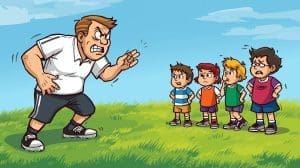30 September 2023

Helping You Gain A Mental Edge
The Art of Honest Self-Reflection to Boost Sport Performance
Are you kidding yourself?
As an athlete it could be argued that in a competitive situation and in training your job is to give maximum effort so that you give yourself the best chance of performing to the best of your ability. For coaches, some people would say, similarly, your role is to do everything that you can to help your athlete or athletes to perform to maximum capacity.
This sounds simple, right? What can stop athletes and coaches to be able to carry this out?
- Faulty expectations of themselves and others
- Flawed goal setting
- Inconsistent commitments levels
- Listening to the wrong people
- Unconscious mental blocks
- Fear
- Over confidence
- And much more…..
One thing I’ve missed from the list is the ability to set some time aside for honest self-reflection. This should be a process every athlete and coach have in place where they self-assess and get some support so that they can reflect on specific situations and their associated expectations, beliefs, thoughts, feelings and actions with sincerity and objectiveness. This time will mean looking in the mirror to gain a deeper and better understanding of yourself, where your motivations lie, what you value about being an athlete or coach, your strengths, the areas that you can improve on and any area that you could focus on for personal growth.
The art of honest self-reflection includes the following 5 aspects:
1. Self-awareness
Honest self-reflection promotes the foundation of behaviour change, self-awareness. Without self-awareness it is very difficult to refine your approach and improve on the decisions that you make and the habits that you carry out.
2. Questioning your approach
Many people are frightened of change, as humans we tend to enjoy remaining in our comfort zone. By questioning your approach to performing or coaching you could expose some areas that are holding you back, that are harming your performances and that are outdated and need throwing to oneside.
3. Being objective
Sport can be a rollercoaster ride of emotions where you experience many highs and lows on a regular basis. As an athlete when you perform week in week out, it is easy to get caught out by strong emotions and then you can become reactive, fixing faults, always fixating on weaknesses or other people’s opinions. Similarly as a coach your ego and self-worth can yo-yo if you let it, depending on the performance of your athlete(s) or team. By being objective in your reflections you can remove emotion and view your world through a different lens, an objective and non-biased or emotional lens.
4. Be vulnerable
By acknowledging our fears and insecurities we open ourselves up to uncomfortable thoughts and feelings. Many people struggle with this, especially the athlete or coach who can take themselves too seriously in their quest for perfection. However, recognising our vulnerabilities is often where the magic happens, and a place that we can then go on to develop resilient qualities associated with the very best performers and coaches.
5. Reflect regularly
Honest self-reflection should become your go-to process if you wish to get better and give yourself the best opportunity to play and coach to your potential. By doing so once, you may get a boost and a surge of motivation. However, in the longer term it’s unlikely to make a great deal of difference to the way you go about your training, competitive performances or coaching. I’d encourage you to see developing a habit of self-awareness and introspection through honest self-reflection as a skill that needs to be practiced regularly, at least once per month.
By taking on this advice, it’s a guaranteed way to continue to develop yourself, you’ll improve your emotional intelligence and with this you’ll improve your decision a great deal. As a result, there is a strong likelihood you’ll become a better footballer, cricketer, hockey player, golfer…. Or coach.
Our latest episodes of the Demystifying Mental Toughness Podcast will also contribute in this regard and help you question your approach.
THE LATEST EPISODE OF DEMYSTIFYING MENTAL TOUGHNESS
Most people at some point experience demotivation, where they lack interest and enthusiasm about something that they have once really enjoyed. This episode #189 is for you if you have reached that point, or if you are experiencing a loss of form or a performance plateau.
Today, I share an approach which is connected to goal-setting and performance profiling and often yields positive outcomes, where athletes frequently feel a lot better about their situation and experience being re-energised as a result.
Enjoy!
In episode 188, I was joined by the author of the Modern Soccer coach series Gary Curneen, where he opened up on an expensive mistake he made on his coaching journey. He also talks a lot about humility and the importance of integrating the psychological side of the game better. This bite-sized episode is for coaches, especially those who are confident in their ability as you’ll note when I share my thoughts at the end and ask you to reflect on your approach.
Our Instagram page also has many golden nuggets that we’ve shared in the last 2 weeks including the following:

RELEVANT BLOGS TO HELP YOU IMPROVE YOUR APPROACH
Blog: Steps To Form A Habit That Actually Sticks
Blog: 6 Reasons Why Goal Setting Doesn’t Work
Blog: 3 Tips to Help You Overcome Setbacks
Blog: Coach Development – Helping Athletes Overcome Fear of Failure
HELPFUL RESOURCES TO AID YOUR DEVELOPMENT
Performance Profile for Long Term Goals
Performance Profiling: When You’re Looking For A Quick Boost

RELEVANT PODCAST EPISODES TO IMPROVE YOUR APPROACH TO PLAYING SPORT OR COACHING
Ep021: Steve Hackney – How to Reach Your Full Potential
Ep 084: Dr Jim Afremow and Phil White – Mental Toughness and The Leaders Mind
Ep086 – David Charlton: Observations – How to Learn From Setbacks
Ep166: Mark Bennett MBE – How To Help Athletes and Coaches Reflect On Their Performances
SPORT SPECIFIC RESOURCES FROM OUR SPORTS PSYCHOLOGY LIBRARY TO HELP YOU
Soccer or Football Psychology Resources
FUTURE DEVELOPMENTS
As I’ve mentioned in the Mental Edge recently, starting next week our podcast Demystifying Mental Toughness will have 2 episodes per week, for 10 weeks where in addition to Friday’s episode I’ve created 10 football or soccer specific episodes, to be released on Tuesday’s to help footballers and coaches enjoy their experience of the sport more. A regular newsletter will also follow later in the month called The X-Factor. Please do email me should you wish to sign up to our regular tips specific to football enthusiasts.
3 WAYS TO LEARN MORE ABOUT OUR WORK:

Best Wishes
David Charlton
Online Sports Psychologist | Mental Performance Coach who supports many highly motivated athletes, young and old, developing their skills or who are already highly skilled so that they gain a mental edge and get the most from their talent across the globe from USA/Canada to Great Britain and Ireland to UAE, South Africa, Australia and New Zealand, using ONLINE Video Conferencing.
Managing Director – Inspiring Sporting Excellence
Host of Demystifying Mental Toughness Podcast
Founder of The Sports Psychology Hub
Author of The Mental Edge
With over a decades’ experience supporting athletes, coaches, parents and teams to transfer their skills from training to competitive situations, under pressure.







